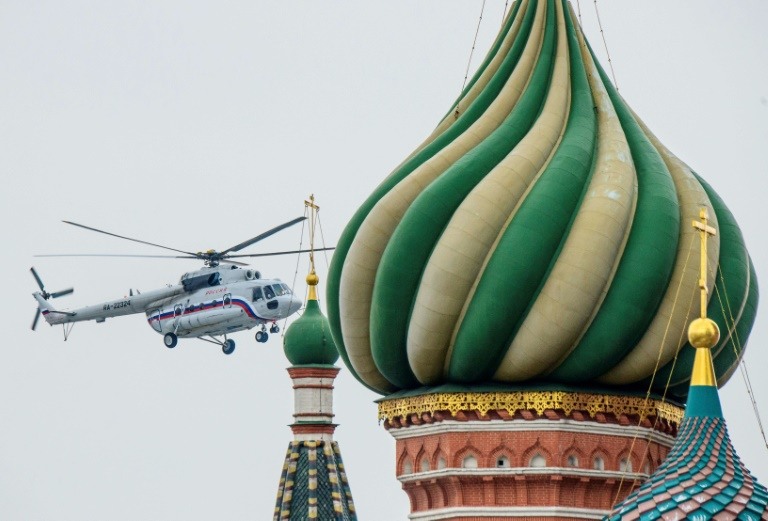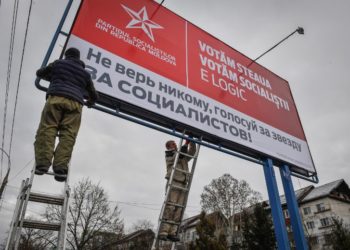The Istanbul-based Ecumenical Patriarchate on Thursday said it had agreed to recognize the independence of the Ukrainian Orthodox Church, in a move welcomed with jubilation by Kiev but condemned as “catastrophic” in Moscow.
Russia had warned against allowing the Ukraine Church to sever its ties with Moscow, with the powerful head of the Russian Orthodox Church, Patriarch Kirill, travelling to Istanbul earlier this year in a bid to dissuade the patriarchate.
The issue is set to play a key role in Ukraine’s March 2019 presidential elections, with incumbent President Petro Poroshenko making independence from the Russian Orthodox Church — known as autocephaly — a key issue as he plans a re-election bid.
Poroshenko quickly hailed the decision of the Patriarchate, which is based in its historic home of Istanbul, the former Constantinople and once the capital of the Byzantine Empire before the Ottoman Muslim conquest of 1453.
“This is a victory of good over evil, light over darkness,” Poroshenko said in televised remarks, adding that Ukraine has been waiting for this “historic event” for more than 330 years.
But the Russian Orthodox Church said that the Patriarchate had taken “catastrophic” decisions both for itself and global Orthodoxy.
“The Patriarchate of Constantinople has crossed a red line,” a spokesman for Russian Orthodox Patriarch Kirill, Alexander Volkov, said in televised remarks.
Historic day for #Ukraine & #Orthodox world. Synod of @EcuPatriarch made a decision to restore justice&opened a way for #UA Church's independence from #Moscow. It's a strong signal to everyone who in the 21st century uses #Church to control the neighbors.Religion is not a weapon
— Ivanna Klympush (@IKlympush) October 11, 2018
‘Canonically Reinstated’
The Patriarchate of Moscow, which is strongly backed by the Kremlin, argues it technically oversees most of Ukraine’s Orthodox parishes and has warned that independence would provoke a rift in global Orthodoxy.
The Ukrainian Church is currently split into three bodies, one technically overseen by the Patriarch of Moscow, a fact the Kiev government considers unacceptable given its ongoing war with Russia-backed rebels in the east.
An Istanbul synod meeting chaired by Patriarch Bartholomew, seen as the first among equals of Orthodox Church leaders, “decreed to proceed to the granting of autocephaly to the Church of Ukraine,” said an official statement read in Istanbul, formerly Constantinople.
In another key move, the synod also agreed to reinstate the head of the Ukrainian Orthodox Church Patriarch Filaret and Kiev Metropolitan Makariy to their canonical ranks following their excommunication in the dispute with Moscow.
“Thus, the above-mentioned have been canonically reinstated to their hierarchical or priestly rank,” said the statement after a meeting that began on Tuesday.
‘Serve Ukrainian People’
Ukraine’s Orthodox church split from Moscow in the 1990s, with the charismatic Filaret a foremost proponent of a new independent Ukrainian Orthodox Church.
In his first reaction, Filaret said Thursday’s decision would allow his country to finally establish a united church in Ukraine and vowed to soon convene a meeting to address the issue of unification and elect a new patriarch.
“We want the Ukrainian Orthodox Church to be united not only in appearance but also in spirit so that it could serve the Ukrainian people,” Filaret told reporters outside St. Volodymyr Cathedral in Kiev.
The Moscow Patriarchate has already downgraded its ties with Bartholomew I over the affair, which it considers an unjust encroachment on its spiritual territory.
On Wednesday, an influential Moscow Patriarch cleric went so far as to warn that parishioners will not hand over churches to a new Orthodox institution willingly.
“Of course, people will take to streets and protect their sacred sites,” Hilarion, a bishop in charge of diplomacy at the Patriarchate, was quoted by Russian agencies as saying at a religious congress in Kazakhstan.
Bartholomew I, a Turkish citizen of Greek origin who commands huge international respect for promoting inter-faith dialogue, will also not want to antagonize the Turkish authorities who are pressing a policy of a strong alliance with Russia.
Ukraine and Russia have been at loggerheads since 2014 when Kiev street protests urging Ukrainian integration with Europe prompted the ousting of pro-Moscow president Viktor Yanukovych.
Russia annexed the Ukrainian peninsula of Crimea later that year and backed rebels who carved out two unrecognized breakaway regions in Ukraine’s mineral-rich east in a conflict that continues to this day.
Ukrainian authorities and many worshippers are wary of the influence of Kirill, a strong ally of President Vladimir Putin who has supported the annexation of Crimea from Ukraine and the separatists in the east of the country.





















